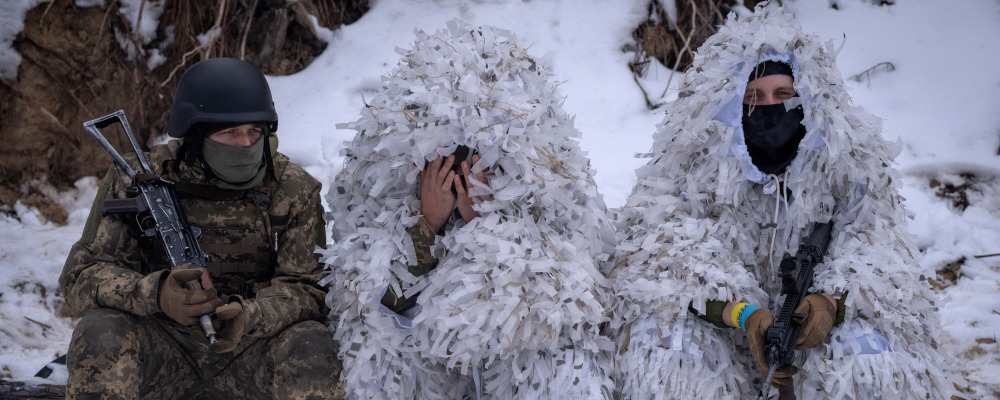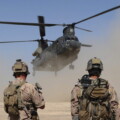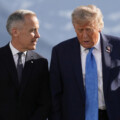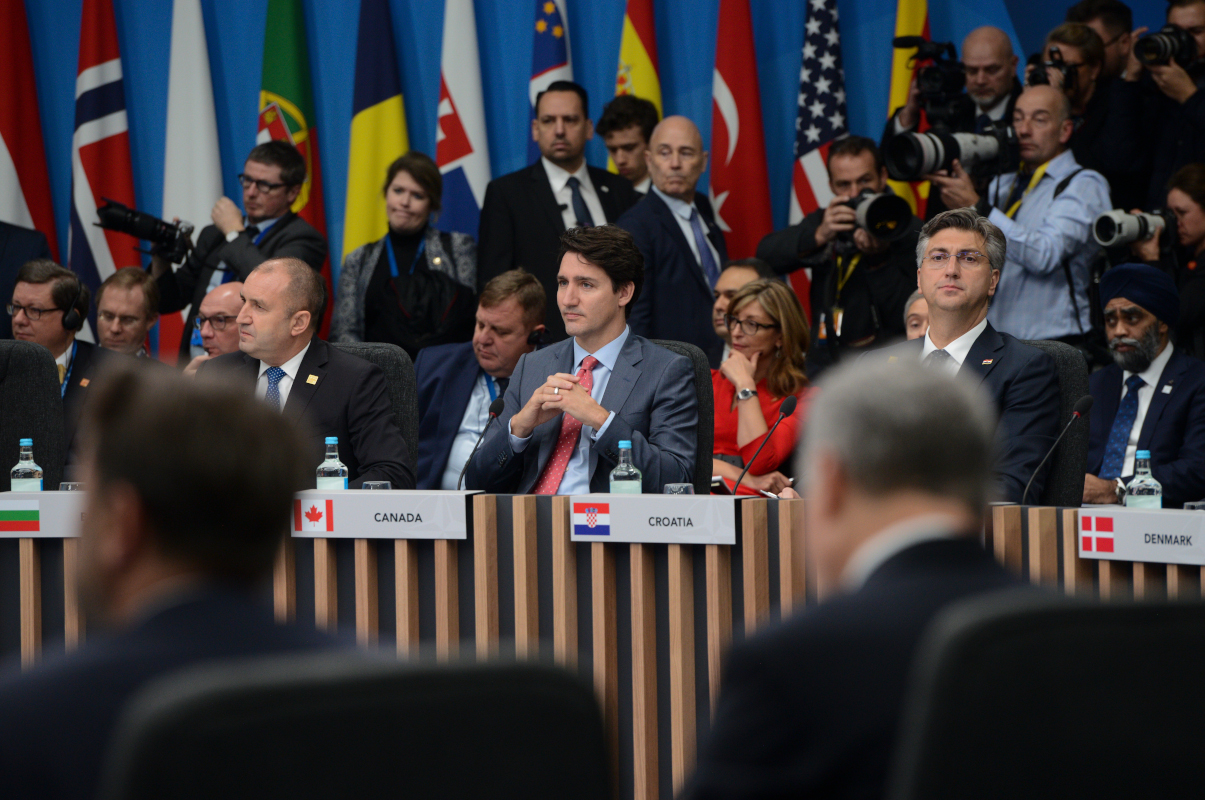As federal MPs leave their ridings and return to their green padded seats in the House of Commons at the end of this month, we at The Hub thought it would be a good time to ask Canada’s leading foreign affairs experts, some of whom have spent time advising the federal government, which major global affairs issues and regions they believe our elected representatives must keep top of mind during the 44th Parliament.
We can’t predict what MPs will focus on when they get back to policymaking, but here’s what the experts think they need to look out for immediately:
China’s decline and an impending Canadian G7 summit
Garry Keller, vice president at StrategyCorp and former chief of staff to John Baird, former foreign affairs minister
As 2024 begins, it’s hard not to be consumed with a feeling of foreboding given the state of the world.
Conflicts like Russia/Ukraine and Israel/Hamas continue to fill our news feeds, and, of course, the U.S. presidential election cycle kicked off in earnest this week with the Iowa caucus, followed closely next week by the New Hampshire primary. Given the impact of the last Trump administration on Canada’s trade, domestic, and foreign policy, we should obviously be watching the 2024 cycle closely.
2024 is a unique year. Nearly half the world’s population is eligible to vote in elections. While no one should be paying much attention to [Russian President] Vladimir Putin’s sham campaign, countries like India, Indonesia, and the United Kingdom will also be in election mode.
Outside of those news-leading events, I’m watching for the following:
1. China’s economic dip. The Chinese economy experienced a downturn over the course of 2023. The reality of falling exports, weak demand, increased “friendshoring” and the decline in the property market (see real estate developer Evergrande) will be something to watch. As well, the re-election of the Democratic Progressive Party to Taiwan’s presidency last weekend means the cross-straits relationship will continue to impact regional security decisions.
2. The Canada-India relationship. Given how the bilateral relationship has deteriorated over the years, coupled with Prime Minister Trudeau’s accusation in the House of Commons over Indian involvement in the Hardeep Singh Nijjar murder, plus Prime Minister Narendra Modi’s upcoming re-election campaign, Canada-India relations will continue to be important to watch, especially for Canadian industry and business.
3. BRICS expansion: Impactful or much ado about nothing? This month we saw the BRICS alliance welcome five new members: Egypt, Ethiopia, Iran, Saudi Arabia, and the United Arab Emirates (UAE). They join Brazil, Russia, India, China, and South Africa. Given that founding member Brazil is scheduled to host the G20 this year, and Saudi Arabia and the UAE are playing an important role in the world economic and political order, how does BRICS membership impact the “democratic West,” especially how the United States deals with these three players (if at all…)?
4. Canada to host a G7. With the 2024 G7 leaders’ summit scheduled for this June in Italy, work has already begun across the government of Canada to sketch out what our priorities will be for our 2025 presidency. A G7 summit in Canada during a potential election year may make for interesting domestic considerations!
Trump and AI’s shadow loom large
Janice Stein, Belzberg Professor of Conflict Management at the Munk School of Global Affairs and Public Policy
1. The U.S. election and Trump 2.0. One global issue “trumps” all others for Canada in 2024. The presidential election in the U.S.—both in its direct impact on our bilateral relationship and indirectly through its impact on all the global issues that Canadians care about, from climate change to peace and security. We need to prepare now for two scenarios.
2. Artificial intelligence. A second issue that does not get the attention it deserves is the development and regulation of artificial intelligence. AI will affect all of us in increasingly important ways in the next few years. Canada was an early pioneer in AI but has not kept pace with the investments that the private sector and governments have made in other countries. Brazil, France, and Saudi Arabia are now investing in big ways to grow national champions. We risk being left behind.
We need policymakers at the table now. Canadian scientists and businesses need more “compute” power if we are to stay in the game. Then we need “smart” regulation for a technology that promises both great opportunity and serious risks. Ottawa should be engaging now in widespread public consultations about AI regulation. It can then partner with other like-minded governments who are more likely to move at speed than multilateral institutions. Acting as a coalition, they can regulate the design of systems so that they minimize the harms and get out of the way of responsible innovation.
In the last decade, Canadian governments, working together with the private sector and universities, have grown the talent pool. That strategy worked. We have some of the very best people in the world right here at home. We need policymakers to build on that success now if we are to reap the benefits of our early investment. Otherwise, we will watch Canada blow a lead, yet again.
A negotiated settlement in Ukraine and the Red (Sea) scare
Ann Fitz-Gerald, director of the Balsillie School of International Affairs and professor of political science at Wilfrid Laurier University
1. The war in Ukraine. 2024 will pave way for continued offensives and counter-offensives in the Ukraine-Russia conflict. While Ukraine will build on its use of drones, Russia will continue to use disinformation strategies to disguise the levels of war fatigue it is experiencing and appease the population of the Ukrainian territory it seeks to control. It will also deepen alliances in the Middle East and Africa.
A reluctance by both the U.K. and the U.S. to put “boots on the ground” during election years may, at best, result in airpower support (F-16s) to shore up Ukraine’s air defences, the lack of which has weakened its ability to protect troops. But a win for Donald Trump in the 2024 U.S. presidential election will likely mean a significant U.S. retreat from Ukraine. This will compel Europe to front the defence of its continent, and with less collective capability to use force, may necessarily push some form of negotiated settlement.

2. Africa and the Middle East. The Horn of Africa will remain a flashpoint in 2024. Current tensions between Somalia and Ethiopia over a signed MOU between Ethiopia and Somaliland that intertwines sea access with Ethiopia’s formal recognition of Somaliland. This will raise concerns across an otherwise peaceful Somali Regional State of Ethiopia, igniting Somali nationalism and potential linkages with other armed nationalist movements, which roam freely in Ethiopia’s other regional states.
Eritrea will continue to feel betrayed over Ethiopia’s post-conflict realignment with the Tigray People’s Liberation Front, the war between the Sudanese Armed Forces and the paramilitary Rapid Support Forces in Sudan will rage on, and a proxy battle to control Red Sea commercial shipping corridors will continue. Ongoing fighting will persist in the form of localized terrorism and insurgency campaigns.
Tensions between the United Arab Emirates and Egypt are also likely to emerge based on the UAE’s continued support of the Ethiopian federal government, while Egypt aligns itself with both Somalia and Sudan. Based on threats posed to the economic supply lines, a new Trump presidency will bring heightened readiness for military intervention in the Red Sea region. The combination of shifting and expanding alliances in the Horn of Africa region and the U.S.-led defence of the Red Sea waters will gradually impact a wider set of actors, including Russia and China, both of which support Eritrea.
3. Arctic China? Although China has been focused on its quest for economic supremacy vs. military activity, its interests in expanding its maritime beltway will see foreign adventurism in the Arctic take on new levels.
4. Misinformation. The rise of transboundary threats enabled by unregulated generative AI will intensify misinformation in elections and democracy, exacerbate harm to children’s mental health based on deepfake manipulation, and entrench powerful monopolies that undermine fair markets and economic dynamism. It will produce a dislocated and inequitable economic structure in an already challenged set of civil society inequities. Lastly, it will undermine the global copyright system.

Invest at home to invest abroad
Roland Paris, Director, Graduate School of Public and International Affairs, University of Ottawa
1. Canada’s foreign policy investments. Governments will always be tempted to announce new initiatives, but what Canada really needs now is to focus on essentials. This is not about a specific overseas event. There is a need to strengthen the foundations of Canada’s international policy so that we can defend and advance our interests. This means rebuilding the instruments of that policy—our defence capabilities, proceeding with the modernization of our foreign service—and the policy capacity of the government to deal with that. We’ve allowed them to weaken. It also includes starting now to prepare for a possible return of the Donald Trump to the White House – arguably the biggest foreign-policy risk facing Canada.
This is a year to make sure that we’re getting the fundamentals right. If Canada wants to be at any number of important international tables, we need to be contributing to efforts alongside our partners. One of the effects of allowing our international instruments to weaken is that we are not being invited to some of these discussions which are important for our interests.
2. Canada’s military. Crises are multiplying and Canadian interests are more exposed today than in decades. Canada’s military should be seen as an insurance policy against an even more unstable world, yet the the defence policy update first promised in 2022 still hasn’t been announced. Meanwhile, the readiness and capacity of the Canadian Armed Forces have been weakening at precisely the wrong time.
3. Canada’s foreign service. We need to transform and modernize Global Affairs Canada. There was an internal discussion paper, and then the associate deputy minister of Foreign Affairs issued a statement, and then there was the report by the Senate Committee on Foreign Affairs and International Trade, led by Peter Harder and Peter Boehm. (The committee called for the first substantive examination of Canada’s foreign service in more than 40 years.) They identified a number of ways in which our foreign ministry has to be transformed. But that’s going to cost money, and the department’s budget has been cut. This transformation must include getting more Canadian diplomats, our eyes and ears abroad, out into the world so that we can understand problems when they’re emerging.
4. Our Indo-Pacific strategy. It’s one thing to have a strategy for this vital region, but another thing to fully implement it. We’ve seen a lot of trips by ministers and the prime minister this past year, and a new special envoy has just been sent to Jakarta, Indonesia. But if this is increasingly the centre of global economic growth and increasingly an important region in geopolitics, we can’t just pop in from time to time. We have to be present, building or rebuilding those relationships in the region.
Recommended for You

A message to President Trump, from a Canadian veteran of the war in Afghanistan

‘This is not a Jewish problem, it’s a Canada problem’: Holocaust remembrance demands action, not slogans

Carney is right about Canada’s place in the world—but words are not enough

Half of childless Canadian women don’t want kids, nearly a quarter in their 40s aren’t mothers: Statistics Canada




